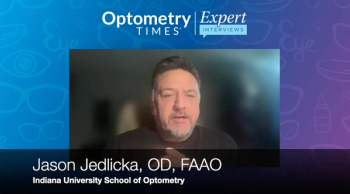
ODs must swim in ‘deep end of the pool’ and avoid over referring
A few months ago, I was phone interviewing a prospective student extern from the auspicious Class of 2020. It was going very well; the student had learned in advance details about our clinic, asked intelligent questions, and anticipated and well answered many of my own.
As we wrapped up, I turned to the same closer question I have asked numerous externs and residents over the years: “What is it that you most want to gain from this experience?”
He floored me with his answer because I had never heard it put quite this way:
Previously by Dr. Brown:
“Dr. Brown, I want to learn what kind of ocular diseases and conditions I can hold on to and manage myself, and when I need to refer. I don’t want to look stupid when I get out of school and start working with other doctors by over referring.”
Well, knock me over with a Schirmer strip, I thought, he just hit the nail on the head without smashing his own thumb!
Know what you don’t know
Over referring is not the most pressing challenge facing our profession, but it is a drag chute holding us back as we try to take off in a full sprint. I have seen many instances of it firsthand, and I when I hear CE lecturers plead with audience members to take on more medical eyecare responsibility during a red eye lecture (“Look, you can do this!), I know it is still a concern.
To be able to treat and manage ocular disease appropriately, you have to know what you don’t know; what to sweat and what not to sweat; and when to “hold ‘em” and when to “fold ‘em.”
While new ODs possess the requisite knowledge and skills to start practicing independently, they still need more patient care encounters to reliably know the difference.
It’s not just optometry. MDs, DOs, and all healthcare practitioners are in the same boat. Everyone continues to climb a steep learning curve out of the gate. The first few post-grad years are a critical time in young doctors’ lives, and the choices they make and opportunities they pursue during that period will set the course of their careers, for better or worse.
We have come a long way in the 50 years since Borish, Haffner, Eger, Wallis, and a bunch of other “mad men” wearing dark suits and skinny black ties
Also by Dr. Brown:
Gain confidence by doing
But we are not fully there yet. ODs need to continue to mature and add more skills to our toolbelts and enlarge the size of our comfort zones so we can fulfill our role as optometric physicians in a world where the population is aging and the need for accessible, efficient, quality eyecare delivery systems grows more critical.
Just as family medicine physicians are being now trained to perform procedures and manage patients who were once referred immediately to specialists, so too must ODs enlarge our professional repertoire to avoid over referring and thereby reserve advanced secondary and tertiary services and resources for patients with the most critical needs.
It’s hard to overstate the role high-pathology optometric residencies play in that process. They are the “deep end of the pool,” and new ODs learn to tread water, dog paddle, and eventually swim fast and long using a variety of strokes. They develop the cognitive skills, pattern recognition, and receive the large number of “meaningful reps” needed to diagnose and treat ocular disease successfully.
This happens quickly and in concentrated fashion. By absorbing the mindset and mannerisms of experienced optometrists and ophthalmologists who have learned “what to sweat and what not to sweat,” new ODs gain confidence in their own judgements and learn the fine art of balancing humility with the confidence and swagger needed to manage patients with difficult and complex conditions.
In a less structured way, young ODs who practice in OD-MD settings straight out of school often have the same opportunities to continue learning the nuances of ocular disease management and discern the many shades of normal and abnormal.
Related:
ODs and MDs working together
Such multidisciplinary opportunities are increasingly common and more plentiful than when I graduated 30 years ago. Team-based, integrated care in which all professionals involved respect and utilize each other’s expertise and experience builds a collegial and collaborative atmosphere conducive to lifelong learning, as well as greater professional satisfaction and enjoyment.
For their part, patients receive more efficient and convenient care that is greater in quality and scope than that provided by each profession separately.
Regardless of their practice settings, young ODs have opportunities to learn from ophthalmologists and more experienced ODs with the help of both longstanding comanagement networks or new collaborative arrangements they may forge themselves.
They should look for ophthalmology consultants who aren’t beholden to the American Academy of Ophthalmology’s apparent ancillary mission of protecting rank and file members by keeping ODs “down on the farm” but instead view educating and sharing their expertise with their OD colleagues as part of their professional obligation to improve the quality of eyecare in their communities.
If treated poorly or turned down, young ODs should knock the dust off their feet and move on until they find ophthalmologists who regard them as colleagues and valuable members of the eyecare team. Thankfully, many longstanding supportive, progressive ophthalmologists, as well as a new generation of young ophthalmologists, are much more open to collaboration for the public good.
However, new ODs shouldn’t limit their search for mentors and consultants to just ophthalmologists. We need to refer to our own more experienced OD colleagues as well.
Related:
Intraprofessional referring
Our profession’s emphasis on independence, intramural competition, and fear of “patient poaching” have produced a certain untoward pride and defensiveness that impedes us from referring to “our own.”
The sharp uptick in the number of ODs with superb disease diagnostic and treatment skills, along with available specialty contact lens practices, dry eye clinics, neuroptometry/rehabilitation centers of excellence, and other niche practice modes is creating more chances to refer to and learn from fellow ODs.
Medical knowledge is proliferative, and there is simply too much to know and too much work that needs to be done for any one doctor to manage everything. We need to be moving away from siloed isolation and looking instead to create pathways of cooperation and opportunities to pool our resources and expertise. Both doctors and patients will be the ultimate winners.
Our extern-to-be is already smart enough to “know what he doesn’t know” and seek out a high-pathology externship to top off his clinical rotations. Regardless of what type of setting he is in next year this time, after four months in our clinic, he will know a lot more about when to “hold ‘em” and when to “fold ‘em.”
I just hope he brings a towel and a swimsuit, because he is about to get soaked.
References:
1. Bennett I. The meeting that changed the profession. Optometry Cares: The AOA Foundation. Available at: http://www.aoafoundation.org/ohs/hindsight/the-meeting-that-changed-the-profession/. Accessed September 19, 2019.
2. Epstein A. Off the cuff: A pathway to parity. Optometric Phys. Available at: https://www.reviewofoptometry.com/newsletter/op/optometric-physician-september-10-2018. Accessed 9/30/19.
3. Mullen C. A unique opportunity for osteopathic health science centers to develop an innovative optometry degree program and postgraduate residency training. Charles F. Mullen: Opportunities and Challenges in Optometry and Optometric Education. Available at: https://www.charlesmullen.com/opportunity-for-osteopathy-to-develop-innovative-optometry-degree-program/. Accessed 10/1/ 19.
Newsletter
Want more insights like this? Subscribe to Optometry Times and get clinical pearls and practice tips delivered straight to your inbox.















































